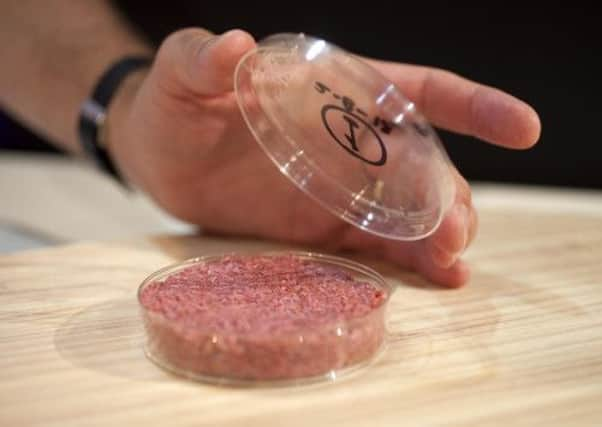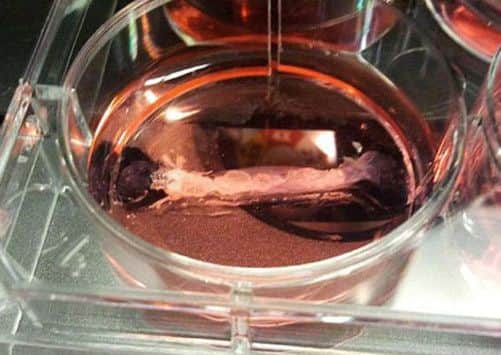Test-tube burger unveiled in world first


In what has been hailed as the beginning of a food revolution which could curb the looming global food crisis as well as climate change, the world’s first laboratory-grown burger was cooked and served before a world audience.
The in-vitro patty, produced using tens of thousands of strips of beef grown from stem cells taken from a dead cow, has been described as “transformative for the world,” allowing meat to produced in an environmentally friendly and ethical way.
Advertisement
Hide AdAdvertisement
Hide AdThe scientist behind the project said he envisaged the cultured beef product appearing on supermarket shelves in as


little as ten years.
However, the burger was given a mixed review by food experts yesterday, with complaints that its texture was wrong, and it was “not that juicy.”
The 5oz patty, funded by Sergey Brin, the billionaire co-founder of Google, was dished up before an invited audience at London’s Riverside Studios.
Professor Mark Post, a vascular biologist at the University of Maastricht, was among those to sample his own creation at the news conference, which was streamed online.
He declared: “I think it’s a very good start. It proved that we can do this, that we can make it and to provide a start to build upon. I am very pleased with it.”
Chicago writer Josh Schonwald author of the book The Taste of Tomorrow, and Austrian food researcher Hanni Rutzler also sampled the burger, which was fried in sunflower oil and butter before being served with lettuce, tomato and bread buns.
Ms Rutzler said there was “intense taste”, but she had expected a softer texture.
“It’s close to meat. It’s not that juicy, but the consistency is perfect,” she said.
Advertisement
Hide AdAdvertisement
Hide Ad“The absence is the fat, it’s a leanness to it, but the bite feels like a conventional hamburger,” Mr Schonwald said. “This is kind of an unnatural experience in that I can’t tell you over the past 20 years how many times I have had a burger without ketchup or onions or jalapenos or bacon.”
In a video shown before the burger was cooked by chef Richard McGeown, Mr Brin said he was backing the technology because it could change the world.
He said: “Some people think this is science fiction – it’s not real, it’s somewhere out there. I actually think that’s a good thing.
“If what you’re doing is not seen by some people as science fiction, it’s probably not transformative enough. It’s really just proof of concept right now.”
As well as addressing the increasing demands faced by intense livestock farming to feed the world, those behind the initiative say the burgers can have health benefits.
An advantage of test-tube meat is that it can be customised, claims Professor Post, who pointed that levels of polyunsaturated fats could be increased.
The animal welfare organisation, People for the Ethical Treatment of Animals, welcomed the research. A spokesman said: “Lab-grown meat will provide people who were addicted from childhood to the saturated fat in flesh with the ‘methadone’ for their habit.”